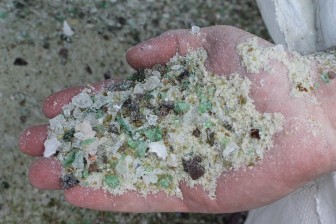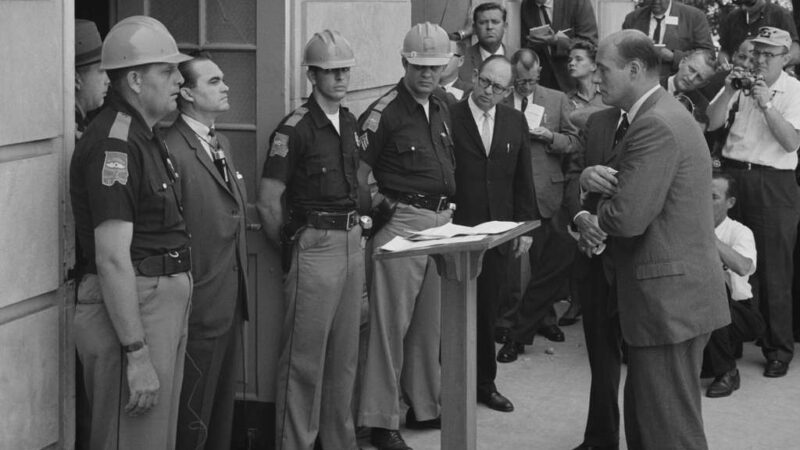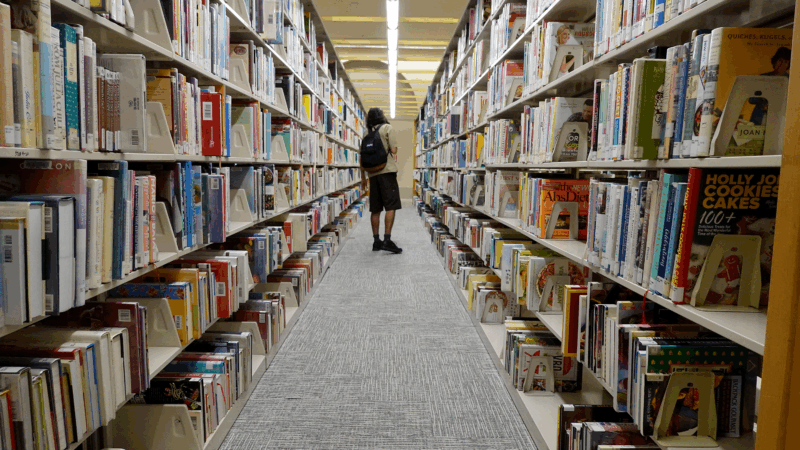Why Is It So Hard to Recycle Glass in Alabama?
Glass is a part of our daily lives. It’s in our refrigerators and our cabinets. We eat off it. We drink out of it. It’s everywhere. Everywhere but in our recycling bins, and that’s because the majority of waste services in Alabama don’t recycle glass.
But that’s not the case at the Alabama Environmental Council’s recycling center, where it’s a little noisier these days because of their new glass pulverizer. A mixture of glass, sand, and water travels along a 16-foot conveyor belt that carries it up and drops it into a large dumpster where it gets ground down.
“It crushes it down to a [less than] three-eighths-inch product, which is safe to touch, safe to walk on,” says Michael Churchman, Executive Director of the Alabama Environmental Council (AEC).
AEC, Greater Birmingham’s only glass recycler, had stopped taking glass in 2012 because the market for recycled glass had fallen, partly because its use in cement decreased. “[And that’s what] ultimately lead to us having to shut that operation down and look for a better way to make glass recycling work,” he continues.
But public demand for glass recycling remains steady. There’s an economic side to it that most people don’t understand, though. For example, says Churchman, there’s no market for recycled glass in Alabama. The AEC, which resumed taking glass this spring, charges a fee that helps cover the cost to ship it out of state. Most of the glass collected goes to a sandblasting company in Tennessee.
Sam Dillendard of Santek Waste Services in Gardendale says shipping recycled glass is cost-prohibitive for most waste disposal companies, and partnering with AEC’s small operation is especially so.
“Unfortunately, they can’t handle the volume of total recyclables that we deliver at one time,” Dillendard says.
There are other factors limiting glass recycling in Alabama. For example, glass is heavy, so it’s expensive to haul, and sorting it often comes with risks to workers or to people dropping it off. While the AEC is a separate drop-off location, most waste industries, including Santek, do something called single-stream recycling. That’s where recyclables, such as aluminum, plastic, and paper, are put in one bin together and then sorted later at a Material Recovery Facility or MRF.
“Our sort line is not set up to separate the glass,” says Leigh Shaffer of Birmingham Recycle and Recovery, a nearby MRF. “So actually if glass does end up in the stream, it ends up as waste and gets hauled to the landfill, along with all the other contamination.”
Even if they were set up to sort glass, there’s no one in the state to take it at that stage of the process, she says.
And that’s something the Alabama Environmental Council is trying to change by raising awareness of the benefits of glass recycling, and just by providing the service.
How George Wallace and Bull Connor set the stage for Alabama’s sky-high electric rates
After his notorious stand in the schoolhouse door, Wallace needed a new target. He found it in Alabama Power.
FIFA president defends World Cup ticket prices, saying demand is hitting records
The FIFA President addressed outrage over ticket prices for the World Cup by pointing to record demand and reiterating that most of the proceeds will help support soccer around the world.
From chess to a medical mystery: Great global reads from 2025 you may have missed
We published hundreds of stories on global health and development each year. Some are ... alas ... a bit underappreciated by readers. We've asked our staff for their favorite overlooked posts of 2025.
The U.S. offers Ukraine a 15-year security guarantee for now, Zelenskyy says
Ukrainian President Volodymyr Zelenskyy said Monday the United States is offering his country security guarantees for a period of 15 years as part of a proposed peace plan.
Genre fiction and female authors top U.S. libraries’ most-borrowed lists in 2025
All of the top 10 books borrowed through the public library app Libby were written by women. And Kristin Hannah's The Women was the top checkout in many library systems around the country.
The Best Tiny Desk Concerts of 2025
Which Tiny Desk made an audio engineer question everything? Which one made a producer want to cry? Touch grass? Look back on the year in Tiny Desk, with the people who make them.








